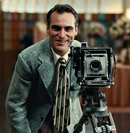This collection of essays opens with philosopher Gilles Deleuze rephrasing and re-articulating Foucault's concept of power. There is little new ground here, but the essay is a good opener. The first real bright spot in this collection is "Foucault's Oriental Subtext", in which Uta Liebman Schaub identifies Eastern influences in Foucault's work. Primarily she sees the obliteration of the self in the remedy to Western systems' ceaseless quest to isolate and peg the self, and to tie this knowable self to an identity, as described by Foucault.
The essay "Foucault's Art of Seeing" by John Rajchman opens with Foucault's startling idea that seeing--vision--"structures thought in advance". The visual representation of thought, of how people have seen their world and then accordingly made sense of it, is tied to their age, their time. So seeing yields different concepts and ways of thinking about a given subject. For example, in the classical age, people grouped plants by their character. Now scientists group them primarily by their surface traits.
 Foucault took an interest in how concepts of visualization become embedded in institutional practices, and how ethical and moral judgements of things and people changed with those concepts. It is hard to imagine now that people asked different questions in the past; we tend to think we've always been "logical", that being logical is part of our nature. But being "logical" used to be a moral exercise.
Foucault took an interest in how concepts of visualization become embedded in institutional practices, and how ethical and moral judgements of things and people changed with those concepts. It is hard to imagine now that people asked different questions in the past; we tend to think we've always been "logical", that being logical is part of our nature. But being "logical" used to be a moral exercise.Finally, Rajchman explains how, for Foucault and his philosophical-critical descendents, thinking is a dangerous act. I found this section of Rajchman's essay confusing; is it dangerous because it's always situated and political? because it's tied to moral and ethical consequences? because we, merely by thinking of things, may unknowingly reinforce or change ways of conceiving? Whatever the answer, the aim on the other side of that danger, what Foucault pursued, is a world that is not yet visible.
In "Beyond Life and Death: On Foucault's Post-Auschwitz Ethic", James W. Bernauer addresses Foucault's critics who charge the intellectual giant with advocating an amoral aestheticism. Bernauer begins his defense by recognizing Foucault's resistance to the scientifically-minded life style that presupposes we are knowable and, therefore, decipherable (and, as a consequence, subject to be judged against norms). He seemed to champion humans as sexual, primarily, and so he probed how sexuality came to be thought of as a moral experience. The modern age and its States conceive of citizens as life to be kept alive; Foucault conceived of man as desire.
That power that conceives of us as human souls in a life or death struggle categorizes us, marks our individuality, attaches us to an identity, subjectifies us, and imposes its truth on us. The sciences--the currently dominant producers and venue of true knowledge--"direct both the cognitive enterprise and the technologies for human self-relation". Foucault examined how people "became anxious about this or that," and urges us not to look so hard at what we hope to achieve, but rather what struggles we face.
Again, Foucault's ultimate goal was freedom. He knew there was no escaping knowledge-power-self relations for good, but he also thought that no "configuration" (of thought and power?) should be thought unchangeable.


